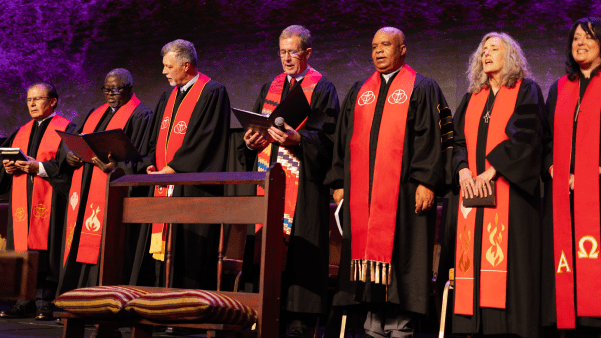When the National Conference of Catholic Bishops completed a statement on Marxism four years ago, critics said they had tackled an easy problem because none of them lived under a Marxist government. The bishops accepted the challenge, and last month released the first draft of their pastoral letter on the U.S. economy.
Archbishop Rembert G. Weakland of Milwaukee, chairman of the committee that prepared the document, said the members “find it a disgrace that 35 million Americans live below the poverty level and millions more hover just above it.”
In addition to Weakland, the committee consists of Archbishop Thomas A. Donnellan, of Atlanta; Auxiliary Bishop Peter A. Rosazza, of Hartford, Connecticut; Bishop George H. Speltz, of St. Cloud, Minnesota; and Bishop William R. Weigand, of Salt Lake City. The pastoral letter will undergo at least two major revisions before it is adopted in November 1985 as the official position of the Catholic church.
None of the committee members has formal training in economics, but they have all handled the administration of a wide variety of parishes in a wide range of economic areas. In preparing the document, the committee consulted some 150 experts in the fields of economics, business, and labor.
Critics, including former U.S. Treasury Secretary William Simon, former U.S. Secretary of State Alexander Haig, and members of a Catholic lay group led by Michael Novak, said the bishops adopted a version of the Democratic party platform.
In the document, the bishops write, “We have often been asked what possible connection there could be between Christian morality and the technical questions of economic policy.… We believe that the level of inequality in income and wealth in our society and even more the inequality on the world scale today must be judged morally unacceptable.”
The prelates say the poor are of special concern because they are vulnerable and needy. All human beings “must measure their actions and choices by what they do for and to the poor,” they add. “The U.S. economy has been immensely successful in providing for the material needs and in raising the living standards of its citizens.” However, the document notes that high unemployment and a rise in the rate of poverty have hurt many during the recent recession.
The 50,000-word document criticizes “policies that put large amounts of talent and capital into the production of luxury consumer goods and military technology” while at the same time “failing to invest sufficiently in education, in the basic infrastructure of our society, or in economic sectors that produce the jobs, goods, and services that we urgently need.”
After surveying Catholic social teaching on economic justice, the bishops turn to the thorny problems of unemployment, poverty, and the nation’s welfare system, the need for “global affirmative action,” and distortions in U.S. foreign aid policy. The bishops recommend “a major new policy commitment” to reduce unemployment to 3 or 4 percent, what they call “a reasonable definition of full employment.” They support increased government backing of “public service employment and also of public subsidies for employment in the private sector.”
The pastoral letter argues for “improvements in welfare programs for the poor” and involvement in “broader social and institutional factors,” such as racial discrimination, “the feminization of poverty,” and the current distribution of income and wealth. It admits that Catholic social teaching “does not suggest that absolute equality in the distribution of income and wealth is required.” But it argues that gross inequalities are morally unjustifiable, “particularly when millions lack even the basic necessities of life.… In our judgment, the distribution of income and wealth [in the United States] is so inequitable that it violates this minimum standard of distributive justice.”
The bishops’ letter argues for global affirmative action. What is needed, they say, is a restructuring of the international order “along lines of greater equity and participation.… In recent years U.S. policy toward the developing world has shifted from its earlier emphasis on basic human needs and social and economic development to a selective assistance based on an East-West assessment of a North-South set of problems.”
The bishops single out the shift in the U.S. role concerning the International Development Association, the branch of the World Bank that makes loans to countries whose per capita income is less than $410 dollars per year. Once a leading supporter, the United States is now “an obstacle to multi-lateral efforts to help poor people in these countries,” the pastoral letter asserts.
A fourth area of concern is the relationship between military spending and foreign aid. Noting that in 1984 “the United States alone budgeted more than 20 times as much for defense as for foreign assistance,” the bishops call for a national and global “campaign for economic democracy and justice.”
Tentatively added to the policy issues to be discussed is the question of food and agriculture, but the bishops wanted to do further work on the topic before they included it.
Evangelicals are as sharply divided over the Catholic bishops’ letter as are Catholics themselves. Ron Sider, professor of theology at Eastern Baptist Theological Seminary and chairman of Evangelicals for Social Action, called the document “extremely important and fundamentally biblical.” Nicholas Wolterstorff, professor of philosophy at Calvin College and author of Until Justice & Peace Embrace (Eerdmans), agreed. “Every Protestant ought to applaud the fact that the bishops argue their case on biblical principles. Cardinal Bernardin’s ability to see abortion, nuclear arms, and the U.S. economy as a logically consistent package is particularly noteworthy.”
On the other hand, evangelicals who are politically conservative could not disagree more strongly. “My reaction was thoroughly negative,” said Ronald Nash, chairman of the Department of Religion and Philosophy at Western Kentucky University. “Where have the bishops been in the last 20 years? We’ve been investing hundreds of millions of dollars in the kind of welfare programs the bishops support, and the percentage of poor people in this country hasn’t changed significantly.”










